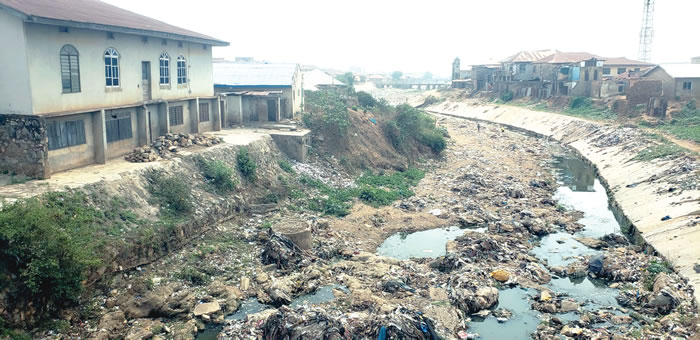•Berate government over lack of intervention
In this report, PHILIP IBITOYE examines the lingering effects of the scourge of open defecation in the rural areas such as Oranyan and Agbongbon which border Kudeti River in Ibadan, Oyo State.
When 28-year-old Tade attended events at his church’s headquarters located along the bank of Kudeti River as an eight-year-old, he was always exposed to a strong, offensive smell coming from a river near the premises. Twenty years later, the stench has not gone away; it has only gotten worse. The stench comes from the Kudeti River channel around the Oranyan area of Ibadan, the Oyo State capital.
The dry ground around the river in Oranyan in Ibadan South-East Local Government Area has been designated an open defecation field by those living in the area where young and old, men and women have patronised for decades.
More than a hundred homes in the area surveyed by Sunday Tribune have no toilet facility, leaving residents with the only option of using open defecation fields near the Kudeti River.
The burning questions on the mind of visitors, onlookers and those familiar with the story are: why has the ugly situation persisted for so long and why has a long-lasting solution to the plight of residents eluded them for years?
Residents who spoke with Sunday Tribune blame perennial neglect by public officials, including ward councilors, local government chairmen, and the state government as the reason for the age-long problem that has continued to rear its ugly head.
Open defecation capital of the world
In October 2019, it was announced that Nigeria was the number one open defecation nation globally, overtaking India which houses over a billion people. Successive administrations in the country have failed to nip the scourge in the bud with the United Nations Children’s Fund (UNICEF) in 2024 estimating that nearly 48 million out of about 200 million Nigerians still engaging in open defecation.
One of the interventions of the governments so far is the official launch of the revised Clean Nigeria Campaign (CNC) Strategic Plan by Vice President Kashim Shettima, at an event organised to commemorate the World Toilet Day on November 19, 2024. The government equally reaffirmed the nation’s commitment to eradicate open defecation by 2030.
Despite the vice president’s renewed commitment, the government neglect of communities like Oranyan raises skepticism of Nigeria reaching that ambitious goal in the next five years.

‘No government intervention’
When Sunday Tribune visited Oranyan, Emiloju was sitting by a shop with his mother. Though his mother was not interested in speaking about the issue, he was receptive to talking about the struggle of residents. According to Emiloju, government officials have paid lip service to their countless calls for help.
“Yes, it [the open defecation fields] is affecting us. We’ve reported the issue to the government so many times,” the visibly disturbed Oranyan resident said. “We’ve told various councilors and local government chairmen to help us find solutions. We would thank God if your presence here helps us get the necessary help.”
Emiloju acknowledged that having an open defecation field near his home and shop is dangerous for his health. “But what will we do?” He queried. “We will keep managing our situation until God touches the hearts of our leaders.”
Another resident, who sat inside a Point of Service (PoS) kiosk near the river, said she had never seen any government intervention put forward to fixing the public health issue.
“No, I’ve not seen any attempt to build public toilets in this community,” the resident who pleaded anonymity said in response to Sunday Tribune’s queries.
This business owner admitted that though her close proximity to the troubled river and the open defecation field is a problem, she does not see a different solution in sight. “We don’t have a choice. It’s not easy at all, but we have to eat,” she added in Yoruba.
Just behind the PoS operator, about five young people, including a woman, sat in front of a stall. A few of them smoked as they engaged in a discussion.
When Sunday Tribune sought their opinion on the state of their environment, they complained that having an open defecation field near them wasn’t a pleasant situation, but they echoed other residents’ sentiments, saying that they are only focused on finding ways to survive as having a toilet facility in their home is not a priority.
“We don’t have any toilet in our home. That’s our toilet you’re looking at in front of you,” a young man in the group, who didn’t want his name in print, said, pointing to the open defecation field.
“Government is unresponsive. Kudeti River is the only option we have. That’s where we ease ourselves. Even our wives put their waste in nylon bags during the day and go dispose them in the river in the night,” another person added.
The group called on relevant government agencies to come to the community’s aid.
As Sunday Tribune concluded the group interview, a man was seen squatting in the open defecation field to ease himself; it was in broad daylight.
We treat residents regularly for cholera, dysentery, typhoid ―Public health officials
To understand the effects of the environmental pollution from the open defecation fields in Oranyan, Sunday Tribune visited the Oranyan Primary Health Centre which is located on the area.
A health assistant at the centre, Mrs Olaogun Mujidat, warned that residents are at great risk of cholera, dysentery, and typhoid.
When asked if residents often presented themselves at the centre with symptoms of these diseases, the health official answered in the affirmative, saying: “We attend to multiple people with cholera and dysentery daily.”
She lamented that the weekly environmental sanitation exercise in Oyo State is no longer widely practiced and enforced, adding that the health centre carries out regular sensitisation programmes on the importance of good hygiene and the dangers of open defecation.
Meanwhile, the neighbouring community of Agbongbon, which a channel of the Kudeti River passes through, is not spared by the environmental pollution of the open defecation fields in Oranyan.
A community health worker at the Agbogbon Primary Health Centre, Mrs Olajumoke Shobaloju, re-echoed the words of her fellow health official from the Oranyan centre, saying residents near open defecation fields risk various life-threatening diseases.
“Cholera and dysentery can lead to death if there is no timely medical intervention. When someone vomits and defecates for up to four hours as a result of cholera or dysentery, their life is at great risk,” Mrs Shobaloju said.
She also disclosed that the healthcare centre has diagnosed and treated various residents for cholera and dysentery, while lamenting that the centre’s outreach programmes have borne little or no fruits.
We are helpless ―Church Leaders
The church near the Kudeti River channel in Oranyan bears the brunt of the environmental disaster as church leaders and members lamented that they’ve been near the river for over two decades and the situation has remained the same or become worse.
A church leader, who pleaded anonymity, said the place of worship has essentially given up after several calls for government intervention went unanswered.
“As you can see, this problem is on our doorstep and we have no part in it, but the unhealthy stench from the river affects our members during services. The community and government have so far failed to fix the mess,” the elder said.
A church member, who simply identified himself as Tobi, said he is always disturbed by the foul smell from the Kudeti River, saying “the smell from the faeces comes and goes during services. We’ve, unfortunately, become used to it.”
Tade, a lifelong member of the church, said many members now use nose masks on the church premises since COVID-19 made the protective cover popular. “I wish government can help us out and build a public toilet facility for these people [Oranyan residents],” he added.
READ ALSO: Nigeria can’t meet 2025 deadline to end open defecation — Minister
WATCH TOP VIDEOS FROM NIGERIAN TRIBUNE TV
- Let’s Talk About SELF-AWARENESS
- Is Your Confidence Mistaken for Pride? Let’s talk about it
- Is Etiquette About Perfection…Or Just Not Being Rude?
- Top Psychologist Reveal 3 Signs You’re Struggling With Imposter Syndrome
- Do You Pick Up Work-Related Calls at Midnight or Never? Let’s Talk About Boundaries







